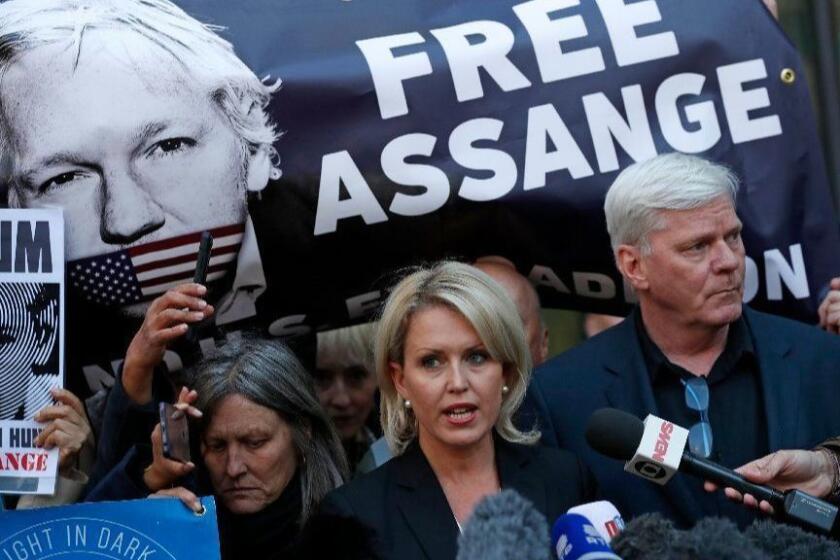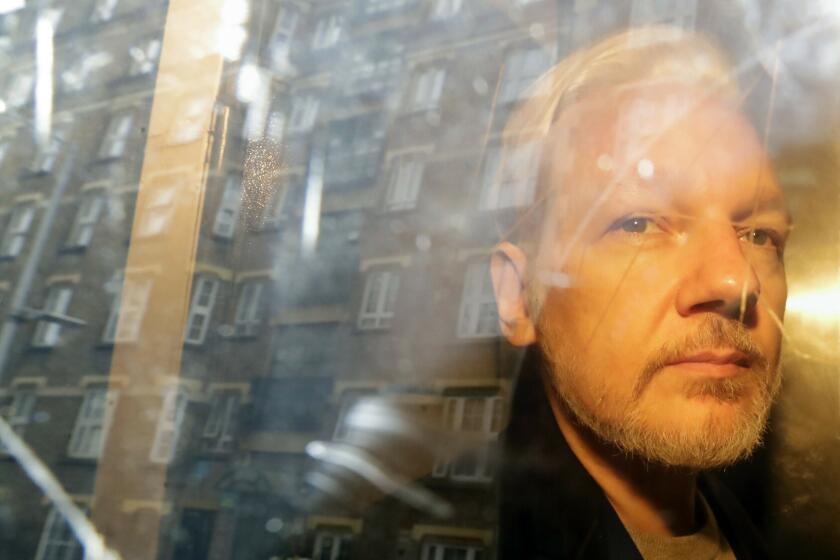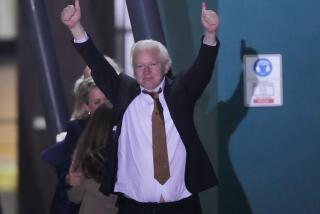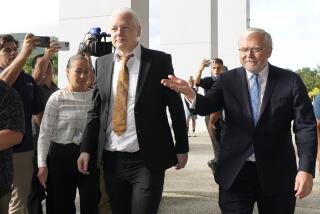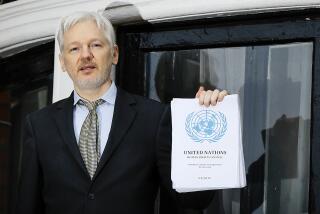British judge blocks extradition of Julian Assange to U.S. on mental health grounds
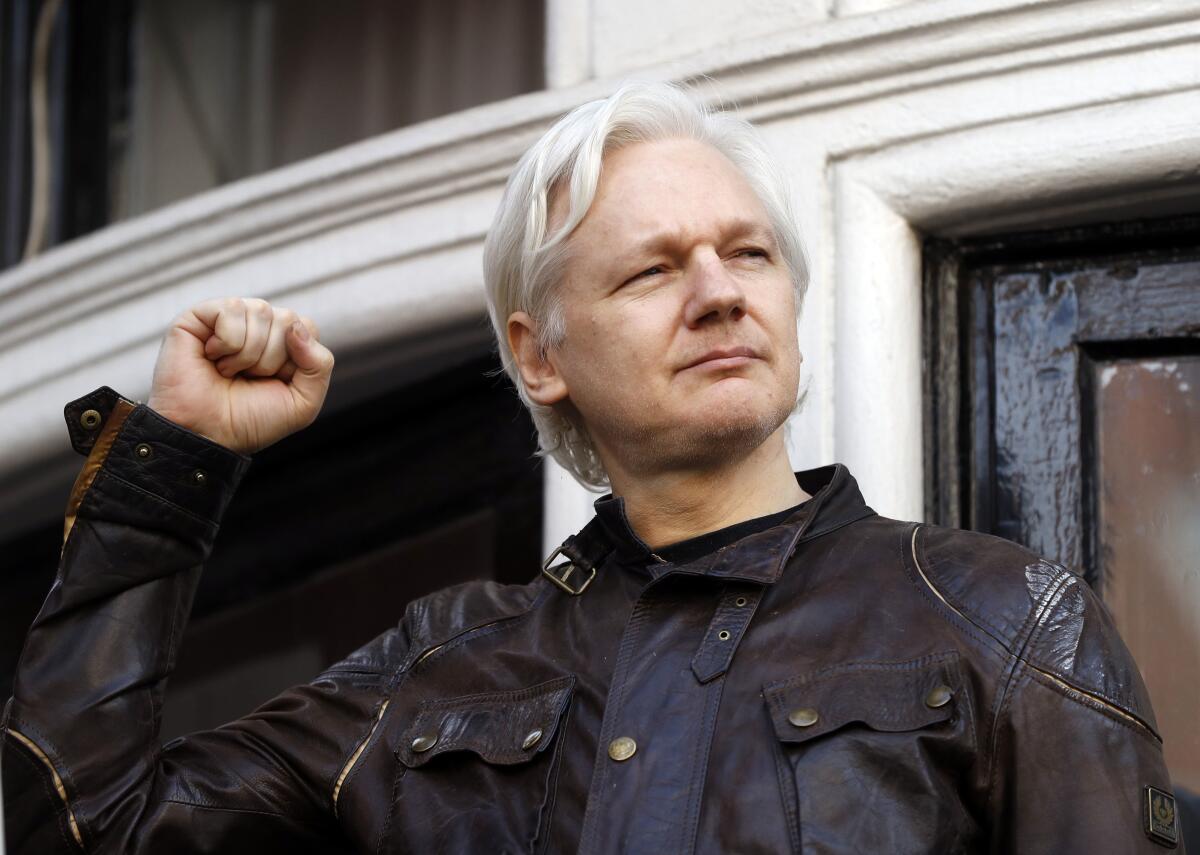
- Share via
LONDON — A British judge Monday rejected the United States’ request to extradite WikiLeaks founder Julian Assange to face espionage charges, saying he was likely to kill himself if held under harsh U.S. prison conditions.
District Judge Vanessa Baraitser rejected allegations from Assange’s lawyers that he was being prosecuted for political reasons or would not receive a fair trial in the U.S. But she said his precarious mental health would likely deteriorate further under the conditions of “near total isolation” that he was likely to face in U.S. prison.
“I find that the mental condition of Mr. Assange is such that it would be oppressive to extradite him to the United States of America,” the judge said.
She said Assange was “a depressed and sometimes despairing man” who had the “intellect and determination” to circumvent any suicide-prevention measures taken by prison authorities.
The U.S. government said it would appeal the decision. Assange’s lawyers plan to ask at a bail hearing Wednesday for their client’s release from the London prison where he has been held for more than a year and a half.
Assange, who sat in the dock at London’s Central Criminal Court for the ruling, wiped his brow as the decision was announced. His partner, Stella Moris, with whom he has two young sons, wept.
With his shock of Warhol-white hair, black leather jacket and self-proclaimed mission to lay bare official malfeasance, Australian-born Julian Assange burst onto the world stage more than a decade ago with his creation of the WikiLeaks website.
Assange’s American lawyer, Barry Pollack, said the legal team was “enormously gratified by the U.K. court’s decision denying extradition.”
“The effort by the United States to prosecute Julian Assange and seek his extradition was ill-advised from the start,” he said. “We hope that after consideration of the U.K. court’s ruling, the United States will decide not to pursue the case further.”
The judge’s decision is a dramatic moment in Assange’s years-long legal fight in Britain but likely not its final chapter.
U.S. prosecutors have indicted Assange on 17 espionage charges and one charge of computer misuse. The charges carry a maximum sentence of 175 years in prison.
A new Justice Department indictment says WikiLeaks founder Julian Assange sought to recruit hackers at conferences in Europe and Asia to provide his anti-secrecy website with classified information.
Lawyers for the 49-year-old Australian argued that he was acting as a journalist and entitled to 1st Amendment protections of freedom of speech for publishing leaked documents that exposed U.S. military wrongdoing in Iraq and Afghanistan. The judge, however, said Assange’s actions, if proved, would “amount to offenses in this jurisdiction that would not be protected by his right to freedom of speech.”
Assange’s lawyers had accused the U.S. of an “extraordinary, unprecedented and politicized” prosecution that sought to “criminalize obtaining and publishing information relating to ‘national security.’”
Assange’s legal team argued that extradition threatened his human rights because he risks “a grossly disproportionate sentence” and detention in “draconian and inhumane conditions” that would exacerbate his severe depression and other mental health problems.
The judge agreed that U.S. prison conditions would be oppressive. She accepted evidence from expert witnesses that Assange had a depressive disorder and an autism spectrum disorder.
In second day of testimony, lawyers for WikiLeaks’ Julian Assange said he partnered with media groups instead of releasing cables naming secret sources.
“I accept that oppression as a bar to extradition requires a high threshold. ... However, I am satisfied that, in these harsh conditions, Mr. Assange’s mental health would deteriorate causing him to commit suicide with the ‘single-minded determination’ of his autism spectrum disorder,” Baraitser said in her ruling.
Lawyers for the U.S. denied that Assange was being sought for extradition merely for publishing the leaked documents, saying that the case “is in large part based upon his unlawful involvement” in the theft of the diplomatic cables and military files by then-U.S. Army intelligence analyst Chelsea Manning.
The prosecution of Assange has been condemned by journalists and human rights groups, who say it undermines free speech around the world.
“This is a huge relief to anyone who cares about the rights of journalists,” the Freedom of the Press Foundation tweeted. “The extradition request was not decided on press freedom grounds; rather, the judge essentially ruled the U.S. prison system was too repressive to extradite. However, the result will protect journalists everywhere.”
Breaking News
Get breaking news, investigations, analysis and more signature journalism from the Los Angeles Times in your inbox.
You may occasionally receive promotional content from the Los Angeles Times.
“The mere fact that this case has made it to court, let alone gone on this long, is an historic, large-scale attack on freedom of speech,” WikiLeaks spokesman Kristinn Hrafnsson said earlier about the case. “This is a fight that affects each and every person’s right to know and is being fought collectively.”
Assange’s legal troubles began in 2010, when he was arrested in London at the request of Sweden, which wanted to question him about allegations of rape and sexual assault made by two women. In 2012, to avoid being extradited to Stockholm, Assange sought refuge inside the Ecuadorian Embassy, where he was beyond the reach of British and Swedish authorities — but also in effect a prisoner, unable to leave the tiny diplomatic mission in London’s tony Knightsbridge district.
The relationship between Assange and his hosts eventually soured, and he was evicted from the embassy in April 2019. British police immediately arrested him for jumping bail in 2012.
Sweden dropped its sex-crimes investigation into Assange in November 2019 because so much time had elapsed, but Assange remains in London’s high-security Belmarsh Prison. He was brought to court in a prison van throughout his extradition hearing.
More to Read
Sign up for Essential California
The most important California stories and recommendations in your inbox every morning.
You may occasionally receive promotional content from the Los Angeles Times.
